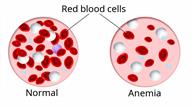Pernicious Anemia

Pernicious anemia is a condition where your body cannot absorb enough vitamin B12 from your digestive tract. Without vitamin B12, your body is not able to make the red blood cells that you need to carry oxygen in your body. Normally, you can get enough vitamin B12 from eating foods such as meat, poultry, eggs, and dairy products. If you have pernicious anemia, you do not absorb enough vitamin B12 from your diet, and anemia develops over time.
When you have anemia, your organs may not work properly, and you may feel very tired. Untreated pernicious anemia can lead to severe symptoms of anemia, including chest pain, heart failure, and permanent nervous system damage.
What are the causes?
Pernicious anemia is believed to be an autoimmune disease. When you have an autoimmune disease, your body's defense system (immune system) mistakenly attacks normal cells in your body.
Normally, your stomach makes a protein called intrinsic factor (IF). This protein helps your body absorb vitamin B12 in your intestines. When your stomach does not make enough IF, your intestines cannot absorb enough vitamin B12. Your stomach may not make enough IF because your immune system attacks the IF or the cells in the stomach that make it.
What increases the risk?
You are more likely to develop this condition if you:
Are older than 40 years of age.
Have a family history of pernicious anemia.
Are of Northern European or Scandinavian descent.
Have another type of autoimmune disease.
What are the signs or symptoms?
Many times there are no symptoms of this condition. Pernicious anemia symptoms may take many years to develop. Symptoms may include:
Tiredness.
Light-headedness.
A sore tongue or a burning sensation on the tongue.
A smooth red tongue.
Stomach problems such as heartburn, diarrhea, or constipation.
Shortness of breath, especially when walking or exercising.
Signs of long-term damage to the nervous system include:
Being unsteady while walking.
Tingling or numbness of hands and feet.
Problems concentrating, confusion, or irritability.
Mental health concerns, such as depression, hallucinations, or false beliefs (delusions).
Loss of smell.
How is this diagnosed?
In many cases, anemia may be found after you have a routine blood test. This condition may also be diagnosed based on:
How is this treated?
This condition may be treated with vitamin B
12 replacement. This may include:
Injections of vitamin B12. This is the most common treatment.
Using a spray that you breathe in through your nose (nasal spray). A vitamin B12 nasal spray may be used to treat people who are not able to swallow supplements.
Taking a pill by mouth that contains a large dose of vitamin B12.
Long-term monitoring and regular visits to a health care provider.
If the condition is found and treatment is started in the early stages, most people do not develop complications. Treatment reverses the condition and prevents future anemia, but it must be continued for life. Having pernicious anemia also puts you at higher risk for stomach cancer.
Follow these instructions at home:
-
Take over-the-counter and prescription medicines only as told by your health care provider.
-
Return to your normal activities as told by your health care provider. Ask your health care provider what activities are safe for you.
-
Eat a healthy diet that includes plenty of vegetables, fruits, whole grains, low-fat dairy products, and lean protein.
-
Keep all follow-up visits. You will need to have your blood level of vitamin B12 checked regularly.
Contact a health care provider if:
-
You develop new symptoms.
-
Your symptoms return or get worse after treatment.
-
You have stomach pain.
-
You have symptoms of an infection, such as a fever.
-
You have trouble swallowing.
-
You have chest pain.
-
You have a rapid or abnormal heartbeat.
-
You have dizziness or you faint.
-
You have trouble breathing.
-
You have pain, swelling, or redness in an arm or leg.
-
You vomit blood.
These symptoms may be an emergency. Get help right away. Call 911.
Summary
-
Pernicious anemia happens when your body cannot make enough red blood cells because it cannot absorb enough vitamin B12.
-
This condition is usually caused by an autoimmune disease. Symptoms may take years to develop.
-
Treatment of this condition includes vitamin B12 replacement for life.
-
Contact your health care provider if you develop new symptoms or if your symptoms return or get worse.
-
Keep all follow-up visits for treatment and monitoring of your condition.
This information is not intended to replace advice given to you by your health care provider. Make sure you discuss any questions you have with your health care provider.
